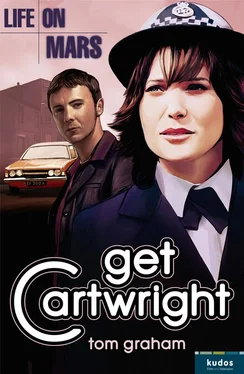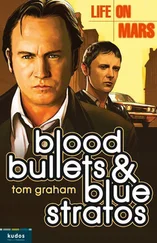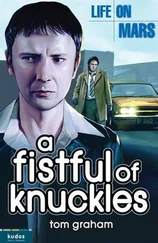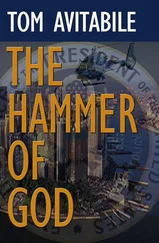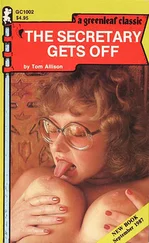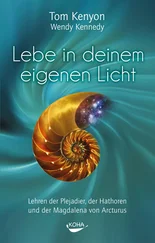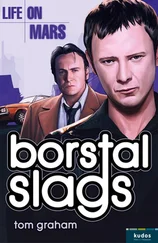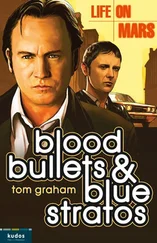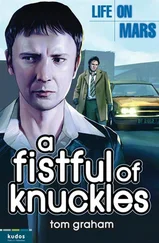‘Yes,’ McClintock nodded slowly. ‘A strange place. Betwixt two worlds. We’re nae the living nor the dead.’
Sam nodded, and said quietly: ‘It’s such a relief to speak to somebody who actually realises that.’
‘Yes. A relief for me too. It is a … burden to know such things. It is a source of great loneliness.’
‘When I first met you, in Mr Fellowes’s office in Friar’s Brook borstal – did you know then?’
McClintock shook his head: ‘No. Not then. I had forgotten I had a life before this one. But it all started coming back to me a little later.’
‘But why , Mr McClintock? Nobody else here remembers. Just me … and now you. Why?’
McClintock stared thoughtfully into his wretched coffee for a few moments before replying. When he spoke, it was with slow, measured words.
‘For a time, when first I arrived here, I could recall my past with clarity, just as you can, Detective Inspector. I remembered the fire that consumed me, I remembered the pain. Like you, I knew that I was dead – or leastways, I was something very much like being dead. But again, like you, though I had lost my old life I had at least gained a new job. I was no longer DS McClintock of Manchester CID, but House Master McClintock of Friar’s Brook borstal. A new post for a new existence.’
‘And what happened?’ Sam asked. ‘You could remember your past life at first ... but then?’
‘The memories started to fade. No, that doesn’t quite describe it. It was more like … I felt less and less inclined to think of the past, what I had once been. When I did think back, it was only in vague terms. And over time, the inclination grew less and the vagueness grew greater until at last … well, until it was as if the past had ceased to exist. I thought no more about it than one thinks of the moment of one’s birth; we were most certainly there, but we recall nothing, not even a gap in our memory. It’s as if it never happened.’
Sam thought of Annie, how she had first reacted when he had once pressed on her past, her family, her parents. It was just as McClintock had described – the total lack of inclination for her to recall her early life, the vagueness of her recollections, the inability to connect with her own memory.
‘Our paths have crossed, Detective Inspector Tyler – and I do not believe for one moment it’s by mere chance,’ McClintock went on. ‘There may be other reasons for your appearance in this so-called 1973, but I believe that one of them was to act as an alarm clock – for me. You woke me up, Detective Inspector Tyler. You saved me from that slow sink into forgetfulness.’
‘How? How did I do that?’
‘It was during that awful siege, when Donner was holding us hostage,’ said McClintock. ‘When I was sitting there, with that knife halfway down my throat, waiting to die, I’ll not pretend to you that I wasn’t terrified. I was certain Donner would kill me, and I was just as certain that it would not be a quick death or a painless one. My mind was spinning, and maybe that was what made me start to remember. Who knows? All I can say is that as I heard you talking about that fob watch, and about the past, memories started to come back to me, confused at first; glimpses – disjointed images … but then, later, when the siege was all over and I was lying in a hospital bed recovering, with nothing to do but stare at the ceiling and think, I started to fit those fragments together and make sense of them. And as I did, I recalled who I used to be … and who I still am.’
‘But what are we?’ Sam asked, leaning forward intently. ‘I once thought we were dead men, and that everyone else here was dead too. But that can’t be. My mother. I met her. I met her here, but I know she’s alive! Right now this very minute she’s alive somewhere.’
‘Time, Space, Life, Death, and all the grey bits in between,’ said McClintock. ‘It’s too big a matter for the mere likes of us to fathom it. But I will say this, Detective Inspector – I have come to think that being dead overlaps with being alive. One state somehow blends with the other, and affects it, influences it. Maybe we all have a foot in both camps. Maybe the living are partly in the world of the dead, and the boundaries of death overlap with those of life. Your mother’s presence here suggests this is so, as do these burned hands of mine. See these scars. They were inflicted in life … and yet here they still are, in this place beyond life. And that trinket also – the watch – the fob watch.’
Sam reached into his pocket and drew out the fob watch, holding it by its chain so that it hung suspended between him and McClintock.
‘Why is it here, Detective Inspector? It has no right to be. It’s a relic from the life I had before this one. And yet here it is, just as real and as solid in this afterlife we find ourselves in as it was before. Ticking away. Still keeping perfect time.’
Sam watched the watch turning slowly on the end of its delicate chain, and again he felt that strange conviction come over him that this little fob watch was important, that it was freighted with a significance that was very real but somehow elusive.
‘The police files dealing with Tony Cartwright’s death have been tampered with,’ Sam said. ‘The facts of his murder have been concealed. And your name has been erased completely. There’s no mention of you. Like you never existed.’
‘Like I never existed …’ McClintock repeated thoughtfully. ‘It’s strange. Perhaps … Perhaps here, in this simulacrum of 1973, I never died in that fire. Perhaps only PC Cartwright died. Perhaps he has moved on to a better place, while I am retained here to complete the task I failed at before. Perhaps … perhaps …’ He shrugged, and fixed Sam with his narrow, pale eyes and added, ‘We’re just coppers, Detective Inspector, we’re nae philosophers. Or priests. Or poets. Or whatever it takes to make sense of ourselves.’
‘Then let’s leave sense to the poets and get back to what we can do,’ said Sam. ‘There’s work to be done. Unfinished business from the lives we’ve left behind.’
McClintock nodded slowly: ‘Yes. I think so. Unfinished business.’
‘Clive Gould,’ said Sam. ‘We’re here to destroy him.’
‘It looks that way to me.’
‘Can we do it? Is it possible?’
‘One must presume so, Detective Inspector, otherwise what point is there in our being here?’ McClintock narrowed his eyes, drew a slow, deep breath, and said: ‘I’ll take any opportunity I can to break Clive Gould. He was always a filthy, rotten creature. It will be a pleasure to destroy him. Back in the sixties, he used his clubs and casinos as a front for all his criminal activities. He tried his hand at all the usual rackets – extortion, robbery, prostitution – and paid out massive bribes to keep the police off his back. And those he didn’t pay off he bumped off – business rivals, debtors, upstarts, traitors, those who crossed him, those who irritated, those whom he decided to make an example of … He chalked up quite a body count, though nobody can put an exact figure to it. Every canal and waterway in this city must have a sludge of his old victims at the bottom.’
Sam wondered if it was one of these anonymous bodies that was dredged up and passed off as Anthony Cartwright. No wonder Carroll refused to let the widow see the corpse.
‘I want to see Gould destroyed as much as you do,’ Sam said. ‘But what happens if we manage it? If we finish this business with Gould once and for all, what then? What becomes of us?’
‘Now you’re asking the big question, Detective Inspector,’ answered McClintock. ‘ Very big. I’ve thought about it, turned it around in my mind, considered possibilities. When our work here is done, will we happen? Will we remain in this place? Or will our tenancy here be terminated? Will we be obliged to move on elsewhere? And if so, where? And then again, what if we fail in our enterprise? What if it is not us who defeat Gould, but him who defeats us ? What is the price of failure here? If we were to perish, Detective Inspector, what then? Where do the dead go who die a second time?’
Читать дальше
